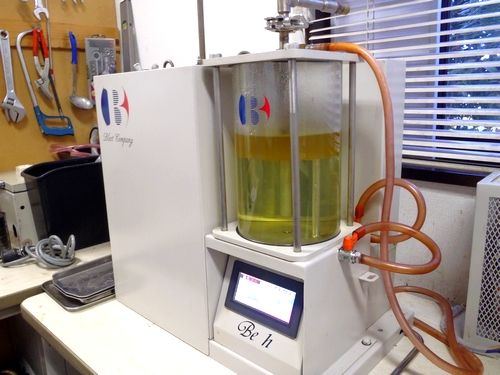Energy
Blest's efforts to transform waste plastic into an "oil field"
2013.02.07 Yoshiaki Seto

Desk-top waste plastic oiling system developed by Blest.
Each year, 265 million tons of plastic are produced around the world (according to data from 2010). Much of the non-biodegradable plastic accumulates on land and in sea wreaking havoc to wildlife that mistakenly swallow such plastic rubbish.
Blest, a company located in Hiratsuka City, Kanagawa Prefecture, has developed products that help conserve the environment. One such product is the oiling system developed in 2001, which converts waste plastic into an "oil field." The system can create a liter of petroleum from a kilogram of waste plastic. Since the system was introduced in the United Nations University's web magazine Blest has received more than 15,000 inquiries from all around the world. There are that many people worldwide who are searching for a good solution for processing waste plastic.
So how does this magical device work? Plastic is created from petroleum. The device simply reverses the process. In other words, by heating waste plastic, it creates petroleum. Impurities may be removed during this process by transforming the plastic into vapor. Combined with a generator, the system can even create energy from waste plastic. This also means that the system can be self-sufficient, generating the energy it needs from waste plastic.
This all sounds very impressive, but there is a downside. It can only recycle certain types of plastic, which are polypropylene (PP), and polyethylene (PE). For safety and other various reasons, vinyl chlorides used to create water pipes and electric cables and PET used in plastic bottles cannot be recycled into petroleum.
Blest president, Mr. Akinori Ito says, "It's harder to make the culture of sorting waste more widespread than developing the necessary technology." Even if you develop an excellent system, if the wrong plastics or the wrong rubbish end up in it, the system won't be able to produce petroleum.
President Ito has helped launch numerous programs to make the practice of sorting waste more widespread. He regularly conducts a class he calls, "School Oil Field," at various schools to teach children about the importance of sorting waste. He also has worked together with the World Championships in Athletics to create all cups and plates necessary for the event out of plastics that can be recycled into petroleum. And he has even written to Lady Gaga recently. In the near future, concerts may be held to promote recycling of plastics. If you work on events and would like to give the system a try, please feel free to contact Blest. They will be more than happy to explore the possibilities.
"Thirty years ago, it was completely normal for people to smoke on the Yamanote Line platform and to throw the cigarette butts onto the tracks. There were so many, sometimes you couldn't even see the gravel. But if you did that now, people will look at you with disapproval. Discarding waste properly has become a culture here in Japan, so why can't we also learn to sort waste?"
Blest's challenge to transform waste plastic into an "oil field" continues.
Related URL/media
http://www.blest.co.jp/index-english.html










